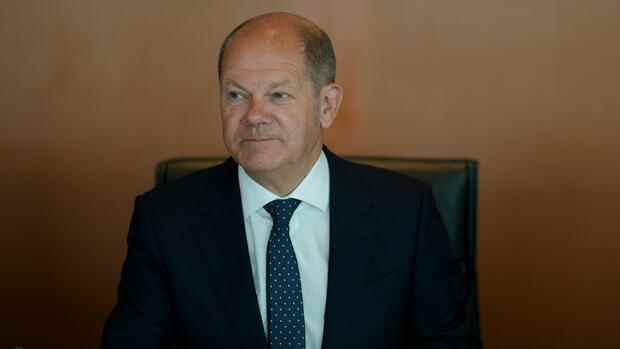The Federal Chancellor reiterated the goal that the Federal Republic should become CO2-neutral by 2045.
(Photo: AP)
Berlin Despite the energy crisis resulting from the war in Ukraine, Chancellor Olaf Scholz is sticking to Germany’s climate protection goals. “Our goal is that we will be one of the first countries to be CO2-neutral and at the same time globally competitive and successful as an economic nation, as an industrial country,” said the SPD politician in his video podcast published on Saturday. The corresponding laws were introduced to ensure that the expansion of renewable energies finally progressed.
“And now we will send other laws later this year so that it works with the pace,” said Scholz and reiterated the goal that the Federal Republic should be CO2-neutral by 2045. The federal government had initially failed with its plan for an overarching immediate climate program and had initially only presented a strategy for the sub-areas of transport and construction.
“It’s bitter that we now have to temporarily use some power plants that we have already shut down because of Russia’s brutal attack on Ukraine,” said Scholz. “But it’s only for a very short time. Because we are really getting started now and want to do everything we can to fight the climate crisis. ”Scholz did not comment on energy security for the coming autumn and winter in his podcast.
When it comes to gas supply, the German Association of Cities expects “a difficult time” in winter. The municipalities have already taken the first measures, general manager Helmut Dedy told Deutschlandfunk. He warned of the consequences of exploding energy prices. The municipalities alone expected additional costs of around 500 million euros in view of the rising costs for accommodation for people on basic social security, which the municipalities have to help finance.
Top jobs of the day
Find the best jobs now and
be notified by email.
In addition, many citizens would not be able to bear the rising utility bills alone. “40 percent of households are unable to save,” said Dedy. “I believe that a tripling of energy prices would be the economic end for many households. And that cannot be right for social cohesion in Germany.” The federal government must step in here, because social policy is the task of the federal government.
Federal Minister of Economics Robert Habeck believes that further relief for medium and low incomes is inevitable due to the enormous increase in gas prices. “Even high earners swallow when they suddenly have to pay 4,500 euros a year for heating instead of 1,500,” said the Green politician to the editorial network Germany (RND). For people with medium or low incomes, these sums are simply not representable. The federal government must organize relief here, also in 2023. “I am sure that the Ministry of Finance will make provisions for this. We have a political task there.”
More: Fear of “social ordeal”: Traffic light politicians worry about the security situation
